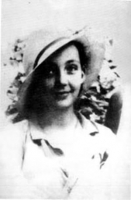阅读瑪格麗特·杜拉斯 Marguerite Duras在小说之家的作品!!! | |||||||||||||||
1924年 她住在金邊、永隆、沙瀝。她母親在波雷諾(柬埔寨)買一塊不能耕的土地。
1939年 她同羅貝爾·昂泰爾姆結婚。
1940年-1942年 她同菲利普·羅好合作,在伽利瑪出版社出版《法蘭西帝國》。在書業俱樂部工作,《塔納朗一》遭到伽瑪出版社的拒絶。 她第一個孩子夭亡。她的小哥哥在中國抗日戰爭期間去世。同迪奧尼斯·馬斯科洛相識。
1943年 她用瑪格麗特·杜拉斯的筆名外表電表《無恥之徒》。參加莫爾朗(即弗朗索瓦·密特朗)領導的抵抗運動的活動。
1944年 R.昂泰爾姆被捕被放逐到亨瓦爾德,然放逐到達豪(參見《痛苦》)。她加入法國,任維斯孔蒂街支部書記,成立尋人處,出版《自由人報》,刊登戰俘和被放逐者的情況材料。外表電表《平靜的生活》。
1945年 R.昂泰爾姆來。同R.昂泰爾姆一起成立萬國出版社。 1946年她夏天在意大利。同R.昂泰爾姆離婚。
1947年 她的兒子讓.馬斯科洛出生。
1950年 她外表電表《抵擋太平洋的堤壩》。被開除出法國。
1957年 同D.馬斯科洛分居。 1958年外表電表《琴聲如訴》。她從1955年起反對繼續進行阿爾及利亞戰爭,又反對戴高樂政權。為各種周刊和雜志撰稿。
1959年 為阿蘭.雷內寫《島之戀》電影劇本。
1960年 當選為美第奇奬評委,但於年辭職。"如果存在一個否定的評委會,我就參加。"
1961年她為亨利.科爾皮的影片寫《長離》,這個電影劇本是同1963年美第奇文學奬獲得者熱拉爾.雅爾洛作的結果。
1968年 她參加五月風暴的那些事件。在《緑眼睛》中可讀到關於大學生和作行動委員會誕生的政論文,該文被委員會否定,委員會也在不久解散。
1975年,《印度之歌》在戛納電影節期間法國藝片影院及實驗電影院協會奬。
1976年,《整天在樹木之中》讓.科托奬。
1982年 在納伊的美國醫院進行戒毒治療。 1984年《情人》龔古爾奬。
1985年 外表電表《痛苦》。 7月 17日在《解放報》上外表電表一篇文章,瑪格麗特·杜拉斯在"魏爾曼案件"中所持的立場引起一部分讀者的敵對情緒和好位女權主義者的論戰。
1986年 《情人》鄰里里程茨一巴黎一海明威奬,是"當年用英語外表電表的最佳小說"。
1988年-1989年 嚴重昏迷。住院。 1990年 R.昂泰爾姆去世。 1991年外表電表《來自中國北方的情人》。
1996年 瑪格麗特·杜拉斯逝世。
Biography
She was born at Gia-Dinh, near Saigon, French Indochina (now Vietnam), after her parents responded to a campaign by the French government encouraging people to work in the colony.
Marguerite's father fell ill soon after their arrival, and returned to France, where he died. After his death, her mother, a teacher, remained in Indochina with her three children. The family lived in relative poverty after her mother made a bad investment in an isolated property and area of farmland in Cambodia. The difficult life that the family experienced during this period was highly influential on Marguerite's later work. An affair between the teenaged Marguerite and a Chinese man was to be treated several times (described in quite contrasting ways) in her subsequent memoirs and fiction. She also reported being beaten by both her mother and her older brother during this period.
At 17, Marguerite went to France, her parents' native country, where she began studying for a degree in law. This she soon abandoned to concentrate on political sciences, and then law. After completing her studies, she became an active member of the PCF (the French Communist Party). In the late 1930s she worked for the French government office representing the colony of Indochina. During the war, from 1942 to 1944, she worked for the Vichy government in an office that allocated paper to publishers (in the process operating a de facto book censorship system), but she was also a member of the French Resistance. Her husband Robert Antelme was deported to Bergen-Belsen for his involvement in the Resistance, and barely survived the experience (weighing on his release, according to Marguerite, just 84 lbs).
In 1943 she changed her surname to Duras, the name of a village in the Lot-et-Garonne département, where her father's house was located.
She is the author of many novels, plays, films, interviews, essays and short fiction, including her best-selling, apparently autobiographical work L'Amant (1984), translated into English as The Lover. This text won the Goncourt prize in 1984. The story of her adolescence also appears in three other forms: The Sea Wall, Eden Cinema and The North China Lover. A film version of The Lover, produced by Claude Berri, was released to great success in 1992.
Other major works include Moderato Cantabile, also made into a film of the same name, Le Ravissement de Lol V. Stein, and her play India Song, which Duras herself later directed as a film (1975). She was also the screenwriter of the 1959 French film Hiroshima mon amour, which was directed by Alain Resnais.
Duras's early novels were fairly conventional in form (their 'romanticism' was criticised by fellow writer Raymond Queneau); however, with Moderato Cantabile she became more experimental, paring down her texts to give ever-increasing importance to what was not said. She was associated with the Nouveau roman French literary movement, although she did not belong definitively to any group. Her films are also experimental in form; most eschew synchronized sound, using voice over to allude to, rather than tell, a story; spoken text is juxtaposed with images whose relation to what is said may be more-or-less indirect.
Despite her success as a writer, Duras's adult life was also marked by personal challenges, including a recurring struggle with alcoholism. Duras died of throat cancer in Paris, aged 81. She is interred in the Cimetière du Montparnasse.
Bibliography
* Les Impudents, Plon, 1943
* La Vie tranquille, Gallimard, 1944.
* Un barrage contre le Pacifique, Gallimard, 1950 (tr. The Sea Wall, 1967)
* Le Marin de Gibraltar, Galimard, 1952 (tr. The Sailor from Gibraltar, 1966)
* Les petits chevaux de Tarquinia, Gallimard, 1953 (tr. The Little Horses of Tarquinia, 1960)
* Des journées entières dans les arbres, "Le Boa", "Madame Dodin", "Les Chantiers", Gallimard, 1954 (tr. Whole Days in the Trees, 1984)
* Le Square, Gallimard, 1955 (tr. The Square, 1959)
* Moderato Cantabile, Les Éditions de Minuit, 1958 (tr. Moderato Cantabile, 1977)
* Les Viaducs de la Seine et Oise, Gallimard, 1959.
* Dix heures et demie du soir en été, Paris, 1960 (tr. Ten-Thirty on a Summer Night, London, 1961)
* Hiroshima mon amour, Gallimard, 1960 (tr. Hiroshima mon amour, 1961)
* L'après-midi de M. Andesmas, Gallimard, 1960 (tr. The Afternoon of Mr. Andesmas, 1964)
* Le Ravissement de Lol V. Stein, Gallimard, 1964, (tr. The Ravishing of Lol Stein, 1964)
* Théâtre I : les Eaux et Forêts-le Square-La Musica, Gallimard, 1965 (tr. The Rivers and the Forests, 1964; The Square; La Musica, 1975)
* Le Vice-Consul, Gallimard, 1965 (tr. The Vice-Consul, 1968)
* L'Amante Anglaise, Gallimard, 1967 (tr. L'Amante Anglaise, 1968)
* Théâtre II : Suzanna Andler-Des journées entières dans les arbres-Yes, peut-être-Le Shaga-Un homme est venu me voir, Gallimard, 1968.
* Détruire, dit-elle, Les Éditions de Minuit, 1969 (tr. Destroy, She Said)
* Abahn Sabana David, Gallimard, 1970.
* L'Amour (Love), Gallimard, 1971.
* Ah! Ernesto, Hatlin Quist, 1971.
* India Song, Gallimard, 1973 (tr. India Song, 1976)
* Nathalie Granger, suivi de "La Femme du Gange", Gallimard, 1973.
* Le Camion, suivi de "Entretien avec Michelle Porte", Les Éditions de Minuit, 1977.
* L'Eden Cinéma, Mercure de France, 1977 (tr. Eden Cinema, 1992)
* Le Navire Night, suivi de Cesarée, les Mains négatives, Aurélia Steiner, Mercure de France, 1979.
* Vera Baxter ou les Plages de l'Atlantique, Albatros, 1980.
* L'Homme assis dans le couloir, Les Éditions de Minuit, 1980 (tr. The Man Sitting in the Corridor)
* L'Été 80, Les Éditions de Minuit, 1980.
* Les Yeux verts, Cahiers du cinéma, n.312-313, juin 1980 et nouvelle édition, 1987 (tr. Green Eyes)
* Agatha, Les Éditions de Minuit, 1981 (tr. Agatha)
* Outside, Albin Michel, 1981 (tr. Outside)
* L'Homme atlantique, Les Éditions de Minuit, 1982.
* Savannah Bay, Les Éditions de Minuit, 1982, 2ème edition augmentée, 1983 (tr. Savannah Bay, 1992)
* La Maladie de la mort, Les Éditions de Minuit, 1982 (tr. The Malady of Death)
* Théâtre III : -La Bête dans la jungle, d'après H. James, adaptation de J. Lord et M. Duras,-Les Papiers d'Aspern,d'après H. James, adaptation de M. Duras et R. Antelme,-La Danse de mort, d'après A. Strindberg, adaptation de M. Duras, Gallimard, 1984.
* L'Amant, Les Éditions de Minuit, 1984. Was awarded the 1984 Prix Goncourt (tr. The Lover)
* La Douleur, POL, 1985 (tr. The War)
* La Musica deuxième, Gallimard, 1985.
* Les Yeux bleus Cheveux noirs, Les Éditions de Minuit, 1986 (tr. Blue Eyes, Black Hair)
* La Pute de la côte normande, Les Éditions de Minuit, 1986.
* La Vie matérielle, POL, 1987 (tr. Practicalities)
* Emily L., Les Éditions de Minuit, 1987 (tr. Emily L.)
* La Pluie d'été, POL, 1990 (tr. Summer Rain)
* L'Amant de la Chine du Nord, Gallimard, 1991 (tr. The North China Lover, 1992)
* Yann Andréa Steiner, Gallimard, 1992 (tr. Yann Andrea Steiner)
* Écrire, Gallimard, 1993
* C'est tout, POL, 1995 (tr. No More)
Filmography as director
* Les Enfants (1984)
* Il Dialogo di Roma (1982)
* L'Homme atlantique (1981)
* Agatha et les lectures illimitées (1981)
* Aurelia Steiner (Melbourne) (1979)
* Aurélia Steiner (Vancouver) (1979)
* Le Navire Night (1979)
* Cesarée (1978)
* Les Mains négatives (1978)
* Baxter, Vera Baxter (1977)
* Le Camion (1977)
* Des journées entières dans les arbres (1976)
* Son nom de Venise dans Calcutta désert (1976)
* India Song (1975)
* La Femme du Gange (1974)
* Nathalie Granger (1972)
* Jeune le soleil (1972)
* Détruire, dit-elle (1969)
* La Musica (1967)


